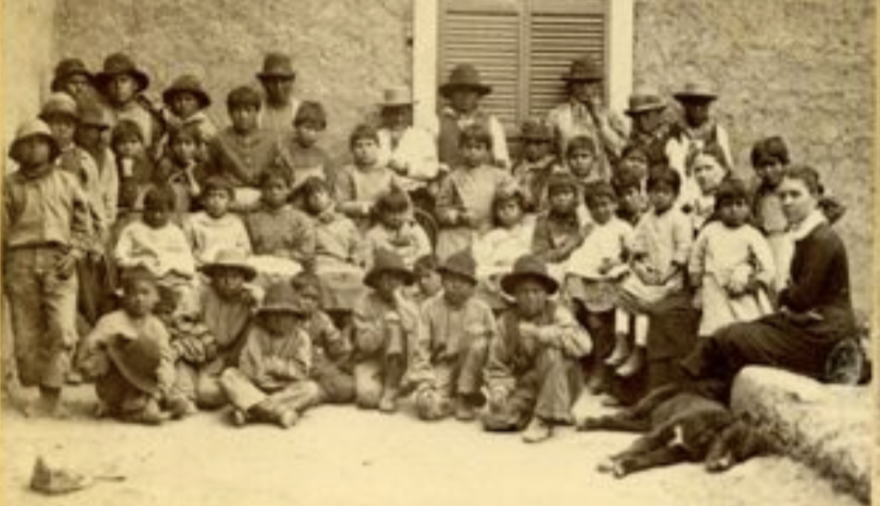The New Mexico Holocaust & Intolerance Museum is hosting an ongoing speaker series called Resistance & Resilience. KUNM spoke with the museum's director of programs Nathan Johnson about the event.
NATHAN JOHNSON: It's one of our more community focused programs that we offer the museum that involves us bringing in certain individuals to present stories, and in this case, stories of resistance and resilience, to kind of share that information and kind of showcase to people in the community kind of the strength hidden in New Mexico, if you look at different cultures. So if you look at the event, we have five different events. Each event targets an individual from a different culture. We have the previous one in December was a gentleman named Dwight Coleman. He's the president of the Buffalo Soldiers Motorcycle Club. That's an organization that the purpose is to kind of spread information and awareness of the Buffalo Soldiers who are a predominantly African American group of American soldiers.
KUNM: Tell more about the upcoming events, what topics will be discussed?
JOHNSON: Actually, Sunday January 14, we have Michael Canfield, he's the CEO of the Indian Pueblo Cultural Center. It'll talk about the boarding schools, Native boarding schools, and how that impacted New Mexico. In addition, we have several others coming up that touch on Japanese incarceration exclusion, which had several camps centered in Santa Fe, and within New Mexico as well. As well as we have Steven Quezada, well known for being an actor on “Breaking Bad.” He's doing a presentation on Hispanic experience in New Mexico being an actor and politician. And then we also have a group coming in from the Netherlands to share a film on hidden children and the Netherlands during the Second World War, during the Holocaust called “Angels of Amsterdam.” And that ties directly to our museum through one of our survivors who was one of those hidden children. So it's really a speaking event that focuses on bringing different communities in New Mexico together, showcase these stories of how their cultures, or them themselves, showed a lot of resistance or resilience in a time of pain, suffering, or danger.
KUNM: Is this the first kind of series the museum has done and do you plan on doing more in the future?
JOHNSON: It's really both, you know, the first series of this kind, but it's also a testbed for us to figure out how to better improve it in the future. And of course, we're going to expand different topics as we go forward. It is a really early kind of form of what we want to make a yearly program at the museum in terms of providing these kinds of stories. So really interesting and cool series and something that we just started doing at the museum because we're really trying to promote a lot more of our adult-focused programs to kind of just grow the museum and also allow these stories to be heard.
KUNM: What do you want visitors to take away from this series?
JOHNSON: It goes back to what we are as a museum, and it really represents you know, we're the New Mexico Holocaust and Intolerance Museum and one thing we've really strived to showcase is that that intolerance section of our name is just as important as a Holocaust section. If you come to the exhibit, you know, it's pretty well split between we have a Holocaust exhibit and we have an exhibit that showcases moments of intolerance, other genocides, other moments of hate and history. And from an educational standpoint, for what we tell students and what we tell adults when they come to museum, it's really important to understand all the types of genocide, but also understand what leads to genocide, and how hate kind of can propagate in a community and what your role as an individual is to stop that from happening.
KUNM: You’ve mentioned you had a speaker event already in December.What was the reaction from that?
JOHNSON: What ended up happening was, it was a lot more of a discussion and sharing of ideas as well. So there was a great discussion on the speakers and the other members that were there to speak, provided a great discussion about the history of their group and the history of the Buffalo Soldiers and why it's important, and the links to New Mexico. And the rest of the time was spent, there's a great discussion and sharing of information on this individual tied to this individual. And I think the one moment there was a poem read, that was tied to a Buffalo Soldier that was written by a Jewish survivor in a concentration camp that had family ties to somebody in the audience. So it was a really great opportunity to have these kinds of sharing of ideas. And I think that was really organic. And it wasn't something that I planned on happening, but it kind of shows how these events, it's not just immersing yourself in the information, it's if someone has information they can provide, they provided it and it became really great discussion towards the end.
KUNM: Thank you Nathan for speaking with us.
JOHNSON: Thank you so much.
Support for this coverage comes from the Thornburg Foundation.





